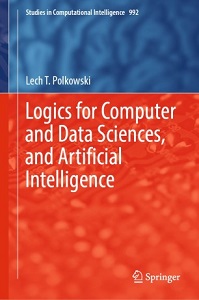
(won the prestigious Professor Zdzisław Pawlak Award for Outstanding Monograph in Computer Science awarded by the Committee on Computer Science of the Polish Academy of Sciences.)

Series Title Studies in Computational Intelligence
This volume offers the reader a systematic and throughout account of branches of logic instrumental for computer science, data science and artificial intelligence. Addressed in it are propositional, predicate, modal, epistemic, dynamic, temporal logics as well as applicable in data science many-valued logics and logics of concepts (rough logics). It offers a look into second-order logics and approximate logics of parts. The book concludes with appendices on set theory, algebraic structures, computability, complexity, MV-algebras and transition systems, automata and formal grammars. By this composition of the text, the reader obtains a self-contained exposition that can serve as the textbook on logics and relevant disciplines as well as a reference text.
https://link.springer.com/book/10.1007/978-3-030-91680-0
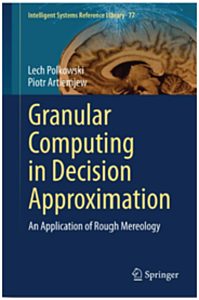 An Application of Rough Mereology,
An Application of Rough Mereology,
In series: Intelligent Systems Reference Library, Vol. 77, 452 pages, Springer (2015)
Short description:
- Recent research on Granular Computing in Decision Approximation
- Fully develops the topic of granular computing in classifier synthesis
- Presents applied algorithms which are illustrated with simple hand examples
This book presents a study in knowledge discovery in data with knowledge understood as a set of relations among objects and their properties. Relations in this case are implicative decision rules and the paradigm in which they are induced is that of computing with granules defined by rough inclusions, the latter introduced and studied within rough mereology, the fuzzified version of mereology. In this book basic classes of rough inclusions are defined and based on them methods for inducing granular structures from data are highlighted. The resulting granular structures are subjected to classifying algorithms, notably k—nearest neighbors and bayesian classifiers.
Experimental results are given in detail both in tabular and visualized form for fourteen data sets from UCI data repository. A striking feature of granular classifiers obtained by this approach is that preserving the accuracy of them on original data, they reduce substantially the size of the granulated data set as well as the set of granular decision rules. This feature makes the presented approach attractive in cases where a small number of rules providing a high classification accuracy is desirable. As basic algorithms used throughout the text are explained and illustrated with hand examples, the book may also serve as a textbook.
http://www.springer.com/gp/book/9783319128795
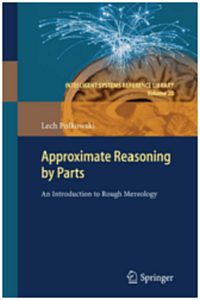 An Introduction to Rough Mereology
An Introduction to Rough Mereology
Series: Intelligent Systems Reference Library, Vol. 20
- An Introduction to Rough Mereology.
- Recent research on Approximate Reasoning.
- Written by a leading expert in the field.
The monograph offers a view on Rough Mereology, a tool for reasoning under uncertainty, which goes back to Mereology, formulated in terms of parts by Lesniewski, and borrows from Fuzzy Set Theory and Rough Set Theory ideas of the containment to a
degree. The result is a theory based on the notion of a part to a degree. One can invoke here a formula Rough: Rough Mereology : Mereology = Fuzzy Set
Theory : Set Theory. As with Mereology, Rough Mereology finds important applications in problems of Spatial Reasoning, illustrated in this monograph with examples from ehavioral Robotics. Due to its involvement with concepts, Rough Mereology offers new approaches to Granular Computing, Classifier and Decision Synthesis, Logics for Information Systems, and are--formulation of well--known ideas of Neural Networks and Many Agent Systems. All these approaches are discussed in this monograph.
http://www.springer.com/gb/book/9783642222788
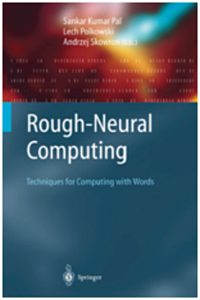
Series: Cognitive Technologies
Techniques for Computing with Words.
Unique text and reference book for graduate students in Computer
Science and for researchers and practitioners in industry and R&D laboratories.
Soft computing comprises various paradigms dedicated to approximately solving real-world problems, e.g., in decision making, classification or learning; among these paradigms are fuzzy sets, rough sets, neural networks, and genetic algorithms. It is well understood now in the soft computing community that hybrid approaches combining various paradigms provide very promising attempts to solving complex problems. Exploiting the potential and strength of both neural networks and rough sets, this book is devoted to rough-neurocomputing which is also related to the novel aspect of computing based on information granulation, in particular to computing with words. It provides foundational and methodological issues as well as applications in various fields.
http://www.springer.com/la/book/9783540430599
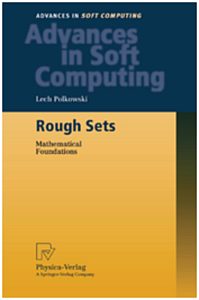 Mathematical Foundations;
Mathematical Foundations;
Series: Advances in Intelligent and Soft Computing, Vol. 15.
- First book on the foundations of rough sets since 10 years.
- Presents deep theoretical results in the book form for the first time.
- Over 300 exercises and an extensive bibliography with all relevant works and current research.
- Self-contained structure providing all relevant information from respective areas of mathematics and logics.
A comprehensive introduction to mathematical structures essential for Rough Set Theory.
The book enables the reader to systematically study all topics of rough set theory. After a detailed introduction in Part 1 along with an extensive bibliography of current research
papers. Part 2 presents a self-contained study that brings together all the relevant
information from respective areas of mathematics and logics. Part 3 provides an overall
picture of theoretical developments in rough set theory, covering logical, algebraic, and
topological methods. Topics covered include: algebraic theory of approximation spaces,
logical and set-theoretical approaches to indiscernibility and functional dependence,
topological spaces of rough sets. The final part gives a unique view on mutual relations
between fuzzy and rough set theories (rough fuzzy and fuzzy rough sets). Over 300
excercises allow the reader to master the topics considered. The book can be used as a
textbook and as a reference work.
http://www.springer.com/la/book/9783790815108
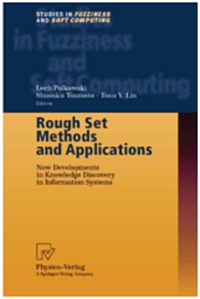
New Developments in Knowledge Discovery in Information Systems
Editors: Polkowski, Lech, Tsumoto, Shusaku, Lin, Tsau Y. (Eds.)
Rough set approach to reasoning under uncertainty is based on inducing knowledge representation from data under constraints expressed by discernibility or, more generally, similarity of objects. Knowledge derived by this approach consists of reducts, decision or association rules, dependencies, templates, or classifiers. This monograph presents the state of the art of this area. The reader will find here a deep theoretical discussion of relevant notions and ideas as well as rich inventory of algorithmic and heuristic tools for knowledge discovery by rough set methods. An extensive bibliography will help the reader to get an acquaintance with this rapidly growing area of research.